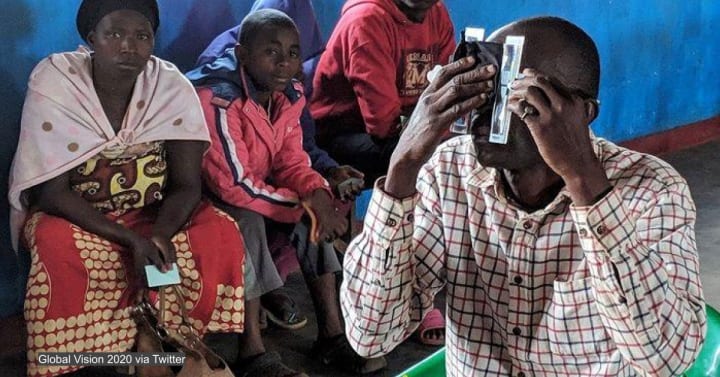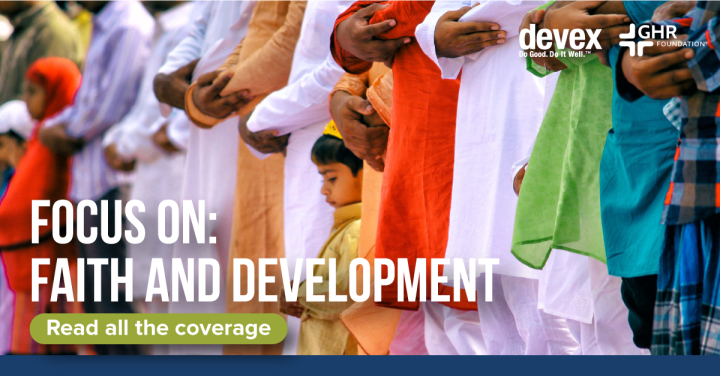
Despite the medical capability to treat 90% of vision loss and impairment worldwide, an estimated 1.1 billion people lack access to basic, life-changing eye care.
A disproportionate number live in low-income and rural communities in regions such as Africa and Asia. According to Greg Wiens, faith-based coordinator for Global Vision 2020, providing vision care to “last-mile” communities often means traveling for hours along rough roads, posing an immense challenge for external aid organizations.
The solution, he said, is faith communities with ongoing operations in remote areas where optometrists are nonexistent. His organization equips local religious leaders to address 90% of vision problems through Global Vision 2020’s USee — a self-refraction device with a focus dial that patients turn until they can see clearly. Colors and numbers on the lens bar correspond to prescription lenses in the vision kit that snap into ready-made frames.
Speaking to Devex, Wiens discussed how faith-based partners have helped Global Vision 2020 reach marginalized communities and how local religious leaders have mitigated cultural challenges and stigma surrounding eye health.
How does Global Vision 2020 find faith-based partners?
We partner with organizations that are already on the ground, including small organizations looking for affordable eye health solutions or larger faith-based organizations like World Vision or Samaritan’s Purse.
In Myanmar, we connect with local monks, giving them glasses and showing them how the USee tester works, as well as using their education centers as distribution locations. Additionally, we work with Muslim communities in refugee camps through the Palestinian Authority and Red Crescent [societies]. It’s a combination of me reaching out to them or organizations hearing about us through word of mouth and asking if they can do a trial.
“The only way we are going to get glasses onto the faces of 1 billion people is through local workers and faith communities.”
— Greg Wiens, faith-based coordinator, Global Vision 2020The United Nations has identified sub-Saharan Africa and Asia as the areas with the greatest need, so those regions are our focus. We also work in areas directly affected by war, such as Iraq and Syria, or with refugee camps.
Faith institutions already have infrastructure in the poorest and most remote locations, including buildings, educational centers, and health care workers. For instance, at our project in rural Malawi, the church is the community center, so when you set up eyeglass clinics, it’s the best place to host them. Additionally, faith leaders have good personal relationships with the locals, and their trustworthiness is high.
Why are secular organizations hesitant to partner with faith-based organizations? What lessons have you learned from these partnerships?
Faith-based organizations are some of the most underutilized partners for medical distribution, often because secular agencies don’t know that they exist or understand what they do. They assume that faith organizations only teach religion.
But I train local church workers — most of whom have a medical background — to distribute the eyeglasses. Then they see if the vision kits are needed in the wider community, and I help them set this up as a small business that gives them an income.
Sometimes, secular agencies are skeptical because religions hold certain exclusive claims of truth that conflict with other religions, and these differences are picked up on much more quickly than what they have in common. Additionally, some religious organizations have served the personal profit of their leaders, and nepotism can be a real problem. So you need to be careful who you work with — but then again, that is true of any organization, faith-based or not.
This project is completely self-sustainable and is not reliant on Westerners coming in and running the project indefinitely. The only way we are going to get glasses onto the faces of 1 billion people is through local workers and faith communities. Of the nearly 40,000 glasses we’ve handed out over the past 18 months, almost 99% were made and distributed by locals.
How do faith-based organizations mitigate community challenges with eye health?
There is stigma with poor vision. People think they have low intelligence because they can’t see well, when really they just need a $3 pair of glasses. When I’ve educated local church leaders on our eyeglass system and the basic mechanics of the eye, lights went on and they became "evangelists" for eye health. They could not wait to tell people that a simple pair of glasses is all you need.
Part of our Focus on: Faith and Development
This series illuminates the role faith actors and their communities play in strengthening global development outcomes.
During a project in Zambia, we learned it was culturally unacceptable for one group to wear hats. However, after the bishop discovered that wearing a hat could protect eyes from the sun and eyeglasses were beneficial, he took my Tilley hat and proclaimed to the church leaders that we should all start wearing hats outside. He said he would be the first to do so! They are now asking for sunglasses as well.
What are some of the challenges you’ve encountered in working with faith-based organizations on sustainable development?
Often, faith-based organizations lack business skills. Asking them to sell eyeglasses and keep track of profits so that they can be self-sustaining and purchase more glasses is really hard work.
For example, in Cambodia a local church started with 500 eyeglasses, which they sold for $6 each. We encouraged them to put $3 aside to purchase more glasses in the future and use the other $3 to pay their salaries. At the end of the year, they should have had $1,500 for glasses. Instead, they only had $500.
Where did the money go? It went to a family who needed money for hospital bills and to another family who needed money for food. A church in Canada bought them another kit of glasses; however, this is not sustainable because when Western money stops coming, the project ends.
Devex, with support from our partner GHR Foundation, is exploring the intersection between faith and development. Visit the Focus on: Faith and Development page for more. Disclaimer: The views in this article do not necessarily represent the views of GHR Foundation.

